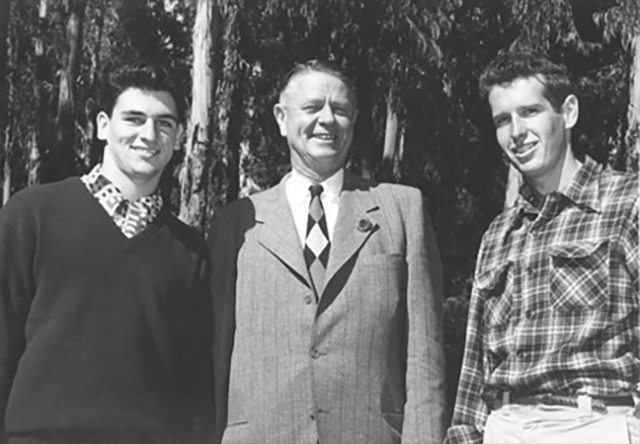Charles S. “Jum” Morris
College president, 1931-1952
As president of San Mateo Junior College for 21 years, Charles S. “Jum” Morris (1887‑1952) united in spirit a campus community sprawled between two, then three locations: Baldwin, Delaware and Coyote Point.
He tackled huge leadership challenges including the Depression and World War II, which brought chaotic swings in enrollment and consequently in funds based on attendance. Morris added the college’s focus on adult education and career training. He forged the industry and community ties needed to secure the college’s future.
It’s believed that college radio station KCSM and later the name of the college itself enshrine Morris’ initials in tribute to his gifts.

A robust former athlete—he was second in the nation in the all-around, forerunner to the decathlon, in 1913—Morris had the energy to plunge deeply into student life and lend a steadying influence with his presence. He attended every college game, every dance and most assemblies and field trips with his wife, Carlena, a college leader in her own right.
Morris got his nickname “Jum,” for “Jumbo,” as a six-foot-four runner specializing in low and high hurdles. He competed for the Olympic Club of San Francisco while earning a masters’ in biology at Stanford. From there, he and Carlena moved to Modesto, where Charles was initially vice principal of the high school and soon led Modesto Junior College.
In 1913, during his Modesto years, Morris took second place in the AAU’s National All-Around Championships in track and field. He competed in 10 events in a single day, scoring 6,082 points to bring home the silver medal.
When then-San Mateo Junior College needed a leader, Stanford, the University of California and the state Office of Education unanimously recommended Charles.
“There had been some difficulty in the student body before we came here,” Carlena remembered in 1979. “At the dances there was a time when there was quite a little drinking.” It was Prohibition and alcohol was illegal, but, as CSM emeritus history Prof. Michael Svanevik has noted, San Mateo County in its then-rural seclusion was a regional font of bathtub gin.
Morris cracked down on the booze and banned the era’s edgiest dances, the Oakland hop, Frisco and Collegiate Shag. Of the near-constant round of freshman-sophomore pranks, rivalry and mayhem that spread into surrounding communities, Morris kept only “The Brawl,” a twice-yearly contest between classes featuring such events as a tug-of-war. He redirected students’ energy toward outlets that doubled as fundraisers, including beard-growing contests, dress-down days and “smokers.”
In 1932, Morris opened the college’s adult division, which offered career and personal development courses mostly in the evenings. These ranged from aviation engineering to floriculture. Within a few years, adult students outnumbered those in the traditional day program. Morris raised millions in cash and donations for the college, netting a helicopter from Hiller Aviation, recording equipment from Ampex, and, in 1947, the former Merchant Marine training school at Coyote Point for a badly needed third campus.
He had a knack for enforcing discipline without shaming. When six former students were arrested for vandalizing college property during the 1936 SMJC-San Francisco City College rivalry game, Morris said only, “They let their enthusiasm get the better of them,” and got the culprits to pay the damage bill.
Charles S. Morris died Feb. 24, 1952 of a heart attack sustained while attending a dance at Coyote Point. Trustees voted two years later to change the college’s name from San Mateo Junior College (SMJC), to College of San Mateo (CSM).
“It was his personality more than anything else that pervaded and gave unity to our institution,” history Prof. Frank Stanger said. “He built up faculty support for his educational ideals, not by demand or compulsion, but through the contagion of his own great devotion to them.
“His sudden dropping out of the midst of things leaves us feeling, as some have expressed it, like orphans.”

